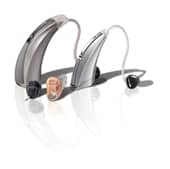Digital vs. Analog Hearing Aids
If you’ve experienced a hearing loss and are in the market for a device to help you hear better, you’ve probably been comparing digital and analog hearing aids.
Analog Hearing Aids
 Like all analog sound amplification equipment, analog hearing aids convert sound waves to electrical waves, which are then amplified before being converted back into sound waves by the ear phone.
Like all analog sound amplification equipment, analog hearing aids convert sound waves to electrical waves, which are then amplified before being converted back into sound waves by the ear phone.
Analog hearing aids let you adjust the sound amplification (volume) and the frequency response (tone) to a limited extent. The hearing aid manufacturer needs to make any other adjustments to the sound an analog hearing aid produces, in accordance with the recommendations of your hearing instrument specialist.
Things to consider when comparing digital and analog hearing aids:
- Some long-time users prefer analog sound
- Lower cost than digital
Digital Hearing Aids
Digital hearing aids convert sound waves into a digital code, which can be manipulated by the hearing aid before being returned to sound waves by the earphone.
The digital code is analyzed by the hearing aid before adjustments are made to it to produce the sound that your hearing aids specialist has determined is right for you. The digital code can be manipulated far more precisely than the electrical waves produced by an analog hearing aid, which allows a digital hearing aid to be customized very closely to your specific hearing requirements.
Things to consider when comparing digital and analog hearing aids:
- With the precise breakdown of the sounds that digital hearing aids allow, certain sounds, including background noise, speech, etc., can be isolated and then amplified or reduced to produce clearer sound
- It is easier to adjust the sound to your preferences
- Most device users agree, the sound produced by digital hearing aids is clearer and easier to understand than analog hearing aids
Programmable Analog & Digital Hearing Aids
Some hearing aids are programmable, which allows your hearing instrument specialist to make the adjustments required by your particular hearing loss in the clinic, without sending the hearing aid to the manufacturer.
Digital Hearing Aid Features that Make a Difference
Digital hearing aids feature in-built attributes that aid in communication in different situations. These include:
Feedback Cancellation
Hearing aids users may experience a whistling sound known as feedback. Analog hearing devices can only prevent feedback by sealing the ear or lowering the volume for mild high-frequency sounds. Digital hearing aids eliminate feedback before it’s transmitted to your brain.
Directional Microphones
Directional microphones allow you to focus on the sounds you wish to hear while filtering out unwanted noises. On analog hearing aids, this function had to be manually activated. Digital hearing aids automatically detect and activate it.
Music Programs
Digital hearing aids can distinguish between speech and music. Analog hearing devices do not have this feature.
Noise Management
Analog hearing aids treat all sounds similarly, making it challenging to distinguish noise from important sounds. Digital hearing aids are modified to allow speech recognition, even in very loud environments.
Connectivity
Digital hearing aids can wirelessly connect to various devices, unlike analog hearing aids that require cords and can only connect to select devices.
Questions to Ask to Choose the Right Hearing Aids
Here are vital issues to ask about before buying a hearing aid:
- What qualities are beneficial to you.
- How much does the hearing aid cost?
- Is there a trial period to try out the hearing devices?
- Warranty information, including what it covers, for how long, and whether it can be extended.
Making The Choice Between Digital And Analog Hearing Aids
The best way to choose the right type of hearing aid is to ask a professional hearing aids specialist who will identify your hearing loss and then help you compare the two technologies based on your specific requirements.
The specialists at Bravo Hearing Centre can help you learn more about digital and analog hearing devices and which one is best for you.
Experience the difference our award-winning (Etobicoke’s Best Hearing Services Award) services can make.
- An audiometric hearing test to identify your needs
- Expert evaluations of your test results
- A full range of top quality hearing aids and other Assistive Listening Devices like personal FM systems, alerting devices, portable personal amplifiers, voice carry-over telephones and TTY/TDD devices improve your comfort and convenience
Find out more about the best hearing aid suppliers for your needs. Call Bravo Hearing Centre today at 416-207-9711 or Contact Us.
Also Read: The Benefits of Digital Hearing Aids


